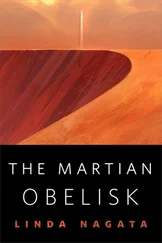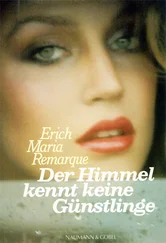It was Riesenfeld who at the last instant instructed us in these matters and turned us into small-time participants in the great sellout. He accepted our first ninety-day note, although at the time we were by no means good for the sum on the face of it. But the Odenwald Granite Works was, and that was enough.
Naturally we were grateful. We tried to entertain him like an Indian rajah when he came to Werdenbrück—that is, insofar as an Indian rajah could be entertained in Werdenbrück. Kurt Bach, our sculptor, made a colorful portrait of Riesenfeld which we solemnly presented to him. Unfortunately, he did not like it. It makes him look like a country preacher, which is exactly what he does not want. He wants to look like a dark seducer and he assumes that that is the effect he makes—a remarkable example of self-deception, considering his pointed belly, and short, bandy legs. But who does not live by self-deception? I, with my innocuous, average talents, do I not cherish, especially at night, the dream of becoming a better man with ability enough to find a publisher. In these circumstances who is to throw the first stone at Riesenfeld’s parenthetical legs, especially when they, at a time like this, are clad in genuine English tweeds?
“What in the world are we going to do with him, Georg?” I ask. “This time we haven’t a single attraction! Riesenfeld won’t be satisfied with just getting drunk. He has too much imagination and too restless a character for that. He wants something he can see and hear, or, better yet, grab hold of. Our choice of women is hopeless. The few pretty ones we know haven’t the slightest desire to spend a whole evening listening to Riesenfeld in his role of Don Juan of 1923. Unfortunately, helpfulness and understanding are only to be found among the older and homely dames.”
Georg grins. “I don’t even know whether our cash will last out the night. When I got the stuff I made a mistake about the dollar rate; I thought it was still the same as at ten o’clock. When the twelve o’clock quotation was announced, it was too late.”
“On the other hand there’s been no change today.”
“There has at the Red Mill, my boy. On Sundays they’re two days ahead of the dollar rate there. God knows what a bottle of wine will cost tonight!”
“God doesn’t know either,” I say. “The proprietor himself doesn’t know. He only decides on the price when the electric light goes on. Why doesn’t Riesenfeld have a passion for the arts? That would be a lot cheaper. Admission to the museum still costs only two hundred and fifty marks. For that we could show him pictures and plaster heads for hours. Or music. There’s an organ concert at St. Catherine’s today—”
Georg chokes with laughter. “Well, all right,” I admit, “it’s absurd to picture Riesenfeld in such a setting; but why doesn’t he at least love operettas and light music? We could take him to the theater, and it would still be much less than that damn night club!”
“Here he comes,” Georg says. “Ask him.”
We open the door. Through the early spring evening Riesenfeld comes sailing up the steps. We see at once that the enchantment of spring twilight has had no effect on him. We greet him with false camaraderie. Riesenfeld notices it, squints at us, and drops into a chair. “Quit the play acting,” he growls in my direction.
“That’s just what I was going to do,” I reply. “It’s not easy for me. What you call play acting is known elsewhere as good manners.”
Riesenfeld grins briefly and evilly. “Good manners won’t get you far these days—”
“They won’t? Then what will?” I ask to draw him out.
“Cast-iron elbows and a rubber conscience.”
“But, Herr Riesenfeld,” Georg says reassuringly, “you yourself have the best manners in the world! Perhaps not the best in the bourgeois sense—but certainly the most elegant—”
“Really? There’s just a chance you might be mistaken!” Despite his disclaimer Riesenfeld is flattered.
“He has the manners of a robber,” I remark, exactly as Georg expects. We play this game without rehearsal, as though we knew it by heart, “Or rather those of a pirate. Unfortunately, they bring him success.”
Riesenfeld has recoiled a little at the word robber; the shot went too near home. But “pirate” reassures him. Exactly as intended. Georg gets a bottle of Roth schnaps out of the cupboard where the porcelain angels stand and pours. “What shall we drink to?” he asks.
Ordinarily people drink to health and success in business. With us it’s a bit difficult. Riesenfeld’s too sensitive a nature for that; he maintains that in the tombstone business such a toast is not only a paradox but the equivalent of wishing that as many people as possible may die. One might as well drink to cholera, war, and influenza. Since then we have left the toasts to him.
He stares at us sidewise, his glass in his hand, but does not speak. After a while he says suddenly in the half-darkness: “What actually is time?”
Georg puts his glass down in astonishment. “The pepper of life,” I reply. The old rascal can’t catch me so easily with his tricks. Not for nothing am I a member of the Werdenbrück Poets’ Club; we are used to big questions.
Riesenfeld disregards me. “What’s your opinion, Herr Kroll?” he asks.
“I’m a simple man,” Georg says. “ Prost! ”
“Time,” Riesenfeld continues doggedly. “Time, this uninterrupted flow—not our lousy time! Time, this gradual death.”
Now I, too, put down my glass. I think we’d better have some light,” I say. “What did you eat for dinner, Herr Riesenfeld?”
“Shut up, youngster, when grownups are talking,” Riesenfeld replies, and I notice that I have been inattentive for a moment. He did not intend to disconcert us—he means what he says. God knows what has happened to him this afternoon! I am tempted to reply that time is an important factor in the note we want him to accept—but content myself with my drink instead.
“I’m fifty-six now,” Riesenfeld says, “but I remember the time when I was twenty as though it were only a couple of years ago. What’s become of everything in between? What’s happened? Suddenly you wake up and find you’re old. What about you, Herr Kroll?”
“Much the same,” Georg replies. “I’m forty but I often feel sixty. In my case it was the war.”
He is lying to support Riesenfeld. “It’s different with me,” I explain. “Also because of the war. I went in when I was a little over seventeen. Now I am twenty-five; but I still feel like seventeen. Like seventeen and seventy. The War Department stole my youth.”
“With you it was not the war,” Riesenfeld replies. “You’re simply a case of arrested intellectual development. That would have happened to you if there’d never been a war. As a matter of fact, the war really made you precocious; without it you would still be at the twelve-year-old level.”
“Thanks,” I say. “What a compliment! At twelve everyone is a genius. He only loses his originality with the onset of sexual maturity, to which you, you granite Casanova, attribute such exaggerated importance. That’s a pretty monstrous compensation for loss of spiritual feedom.”
Georg fills our glasses again. We see that it is going to be a tough evening. We must get Riesenfeld out of the depths of cosmic melancholy, and neither one of us is especially keen on being involved in philosophical platitudes tonight. We should prefer to sit quietly under a chestnut tree and drink a bottle of Moselle instead of in the Red Mill commiserating with Riesenfeld over his lost youth.
“If you’re interested in the relativity of time,” I say, briefly hopeful, “then I can introduce you to a society where you can meet experts in that field—the Poets’ Club of this dear city. Hans Hungermann, the writer, has elucidated the problem in an unpublished sequence of sixty poems. We can go there right now; there’s a meeting every Sunday night with a social hour afterward.”
Читать дальше








